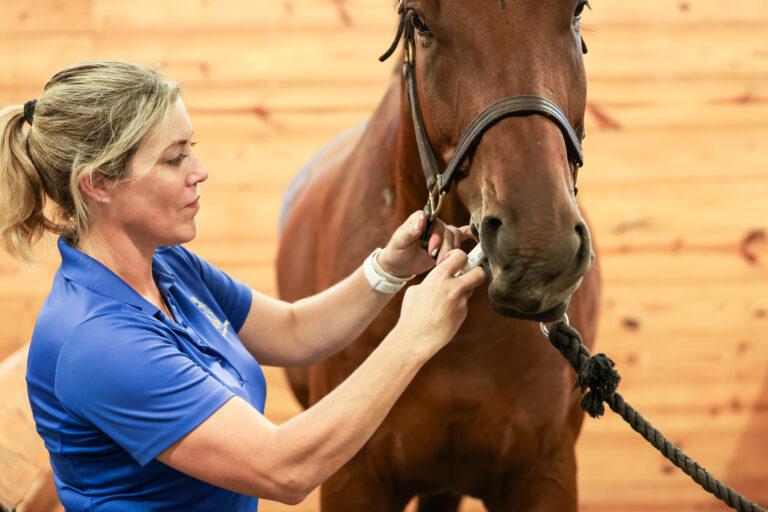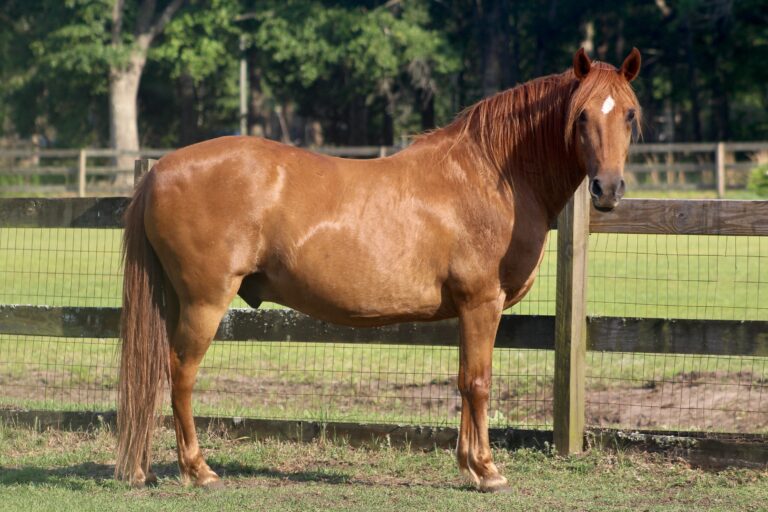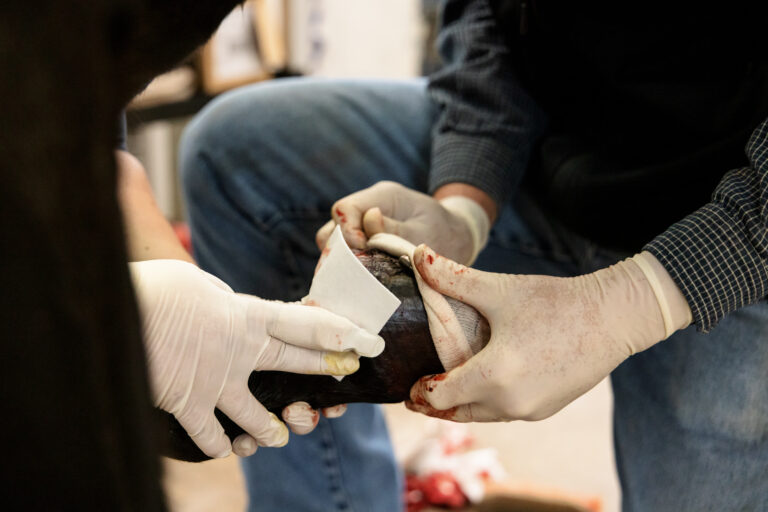 Credit: Courtesy Dr. Ann Dwyer Planning an event takes a bit of time, but if done well, it is worth the investment, as it builds loyalty among current clients and helps attract new ones.
Credit: Courtesy Dr. Ann Dwyer Planning an event takes a bit of time, but if done well, it is worth the investment, as it builds loyalty among current clients and helps attract new ones.It’s a given that you’ll see your clients every spring for routine vaccinations, but how often throughout the remainder of the year do you connect with them? Training and breeding facilities schedule regular calls, but a majority of horse owners may only call your practice once every 12 months.
Hosting an educational seminar is one way to foster relationships with your current clients. You can offer your clients tips and strategies for preventing illness and injury while also discussing new or progressive treatment methods.
An educational event is also an ideal opportunity to introduce your practice to new clients and potentially generate media coverage of your practice. Special events are one way to bring other horse care professionals together for networking and the discussion of health care issues, best practices, case studies and new treatment protocols or methodologies.
Organizing an educational event takes planning and preparation, but if done well, the event can have a lasting effect on the quality of care your clients provide to their horses while simultaneously fostering feelings of appreciation and loyalty toward your practice and introducing you to potential new clients.
The Presentation Topic
Selecting a presentation topic can be daunting. When it comes to equine health care, the topics are endless, but you’ll want to opt for a topic that is relevant and interesting.
The first step in determining a discussion topic is defining the audience. Do you hope to reach horse owners of multiple disciplines or is there a particular group that needs technical information relating to a specific discipline? If the answer is both, then it might be worth planning more than one event at different times of the year. Let’s start with an event designed to attract horse owners of all disciplines.
Regardless of a horse owner’s interests, at some point, every horse owner needs to understand the basics of health care. “We like to choose topics such as wound care and Lyme disease because every horse owner has to deal with these issues,” said Jennifer Stevens, Ag Economic Development Community Educator for Cornell Cooperative Extension in Saratoga County, New York.
Hoof care, lameness and nutrition are also popular topics. The Equine Clinic at Oakencroft has found a practical farriery seminar is a hit with clients. “It covered what a normal hoof should look like, what a long toe and low heels looked like and showed a few case studies,” explained Steven Naile, DVM, co-owner and managing partner at the practice. Oakencroft clients also find value in a presentation entitled “The 3 Cs: Choke, Colic and Cuts,” Naile added.
While horse owners will be interested in emerging diagnostic tools and treatments, as well, there is an increasing interest in management practices not strictly related to veterinary care. “This year pasture management is popular, so we may offer this as a seminar topic,” Naile explained. “We watch the articles in popular magazines for ideas.”
There are also endless opportunities to serve specific segments within the industry. Professionals who are vested in operating a profitable breeding operation or training high-end performance horses are looking for continuing education opportunities, too.
In addition, there is the opportunity to provide education to fellow veterinarians, vet techs and/or farriers. For example, if your practice is known for its specialty services, have one of your veterinarians lead the presentation or bring in an outside expert to discuss new research or treatment methodologies. This will benefit the horses and owners in the area and set you apart as an expert for that service or modality, perhaps resulting in referrals.
“Every October we host a two-day meeting for farriers and veterinarians,” Naile said. “We may work together on a case or have a presentation.”
Poll your clients to discover what topics interest them the most. Ask local riding clubs and the owners of boarding facilities which horse care skills would be of the most benefit to teach their members/customers.
Save the Date
Choosing a day and time for the event might be the most difficult aspect of the planning process. Keep in mind there will never be a “perfect” time to hold an event. However, it is important to consider days and times that will likely be the most manageable for the audience you want to attract. Chances are that this will vary from practice to practice and be based on horse use; often your geographic location will determine timing.
For example, horse owners in the Northeast, Midwest and West might be more likely to attend educational events during the winter months when the weather is unfavorable for riding.
“My formula for planning an event is when it’s not nice out,” Stevens of Cornell said with a laugh. “Usually here that’s the end of November through April.”
On the other hand, an interactive educational event can be well attended in the summer or fall months. Last September, Oakencroft hosted its first youth day, which included activities to educate young horse owners and to encourage other youth to get involved with horses.
The all-day event engaged young riders through hands-on presentations that could not have been held indoors. The time of day and the day of the week are as critical as the time of year.
“We typically hold our events on a Wednesday or Thursday night,” Stevens said. “We start at 6:30 p.m. or 7:00 p.m. and run for two hours.”
Participants have an opportunity to go home after work, feed the horses, do chores and travel to the seminar. A two-hour discussion makes it possible to provide detailed information without keeping attendees for several hours.
“We’ve learned that if the program gets to three hours, we start to lose people,” she added.
Events held after dinner allow for lighter refreshments. “People have already eaten dinner, so we provide coffee, tea, cider, cookies and donuts,” Stevens noted. It helps control costs and reduces the supplies needed for serving.
In other situations, individuals are interested in all-day events that provide in-depth discussions or multiple minilectures. Saturday works best for full-day events and usually includes a lunch, snacks and other refreshments.
“We usually charge a nominal fee to cover our costs and offer local 4-H groups and riding clubs a discount,” Naile explained.
Sponsorships are another way to raise funds to cover the cost of hosting an event. Consider asking vendor representatives and other companies from which you purchase supplies to support your educational events.
“Our youth day ended up with quite a few sponsors, so we could charge a nominal fee,” Naile added.
The size of your practice, the geographical area it covers and your clients will determine how often and what type of events will be successful. Clients may be willing to attend one large, day-long event a year or every other year. Or it might be more practical to hold four to five smaller lectures that last 1.5-2 hours at a time. Talk to clients ahead of time to develop a feel for what will work.
Organizing the inaugural educational event can be intimidating, but the process becomes easier over time. “We have been doing this long enough now that we’re in a rhythm; we look at our notes from the previous year and can quickly put together an event,” Naile said.
Location
Where’s the best place to hold an event? That depends on the featured topic, time of year, budget and your practice. If space is available at your practice, inviting clients, potential clients and other professionals to your site provides an opportunity to showcase any specialties or specialized equipment the practice has to offer. Hosting the event on-site also offers a low-budget alternative to renting space. And depending on the set-up of your practice, it might also lend itself for a hands-on, interactive lecture with a horse, if needed.
On the other hand, if your practice is not large enough to accommodate a group, or not centrally located, renting space might be necessary. Community organizations such as firehouses, fraternal organizations, Cooperative Extensions or community colleges typically rent meeting spaces for reasonable fees.
In either situation, contact your insurance company and ask if your current policy covers inviting the public into your practice for educational events. If you’re using/renting space from an outside venue, the facility might ask for a Certificate of Insurance.
Shout It From the Rooftops!
It’s easy to get wrapped up in the details of planning an event, but don’t overlook the importance of publicizing the event. If your target audience doesn’t know you’re planning an event, they won’t attend and your efforts will have been in vain. Begin promoting the event at least four to six weeks in advance. Larger events should be advertised as soon as a date is determined.
Get creative with regard to spreading the word. Posting flyers at local tack and feed stores, postcard mailers and phone calls is a good starting point. Let riding clubs, 4-H clubs and other local organizations know about the event and ask them to support the event by telling members about the seminar.
The Internet is a powerful tool in promoting events. Social media, the practice website and email can be used to inform people about the upcoming event. Develop and use an organically grown email distribution list (see “Building Your Email List—the Right Way”).
Over the past few years, Stevens has cultivated an e-mail distribution list on which she relies to promote events and which now totals 2,500 email addresses. She fiercely protects the list—never selling or sharing it—and uses it judiciously to ensure that her recipients value the information it provides.
While it reaches a large volume of recipients, it’s not the ideal delivery method for everyone.
“There are still people in rural areas who have trouble opening complicated files (because of Internet service), so we use a basic text format to make sure they get the information, too.”
Even with the ease of promoting events electronically, it’s important to remember that not all horse owners have access to the Internet. Advertising in local newspapers is another alternative.
“I am always surprised when people tell me that they saw our event announcement in the Pennysaver, but people like to read it,” Stevens said.
Even after years of hosting events, “We’re still trying to figure out the best way to get the word out,” Naile said.
That’s a Wrap
Don’t forget the follow-up, which is where you learn a lot about how the event was received and get information on making future events more successful. Here are some tips:
• Don’t miss an opportunity to collect valuable input from the people who attended the event. If possible, take notes on what questions are asked during or after the event and include those as a Q&A on your website.
• Distribute a survey and ask participants to provide feedback about the event. Ask what they liked or disliked about the event, the topic and the overall presentation.
• Find out if the location was convenient and comfortable.
• Ask about the fee charged and the refreshments provided. Did they find it worth the investment?
• Ask for any suggestions for future events.
• If you have the ability to do so, post the presentation and any photos or testimonials from participants to your website to continue the momentum forward to future events.
• And while you’ll be ready for a break, take time to evaluate the event and review the participant surveys while the day is fresh in your mind. Decide how well the event “worked” for the practice and your clients, and consider what could be done differently for future events.
Planning an event takes a bit of time, but if done well, it is worth the investment, as it builds loyalty among current clients and helps attract new ones.




